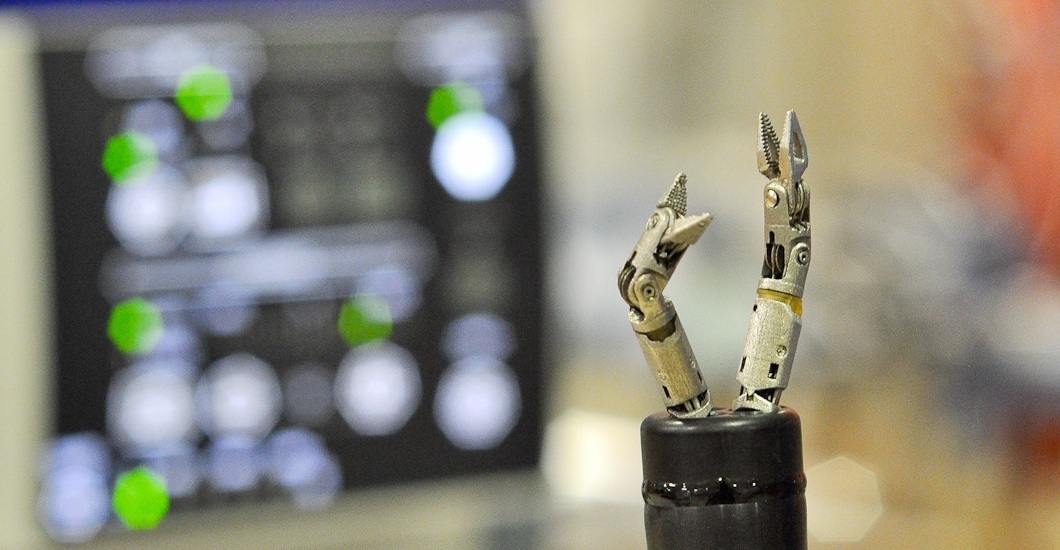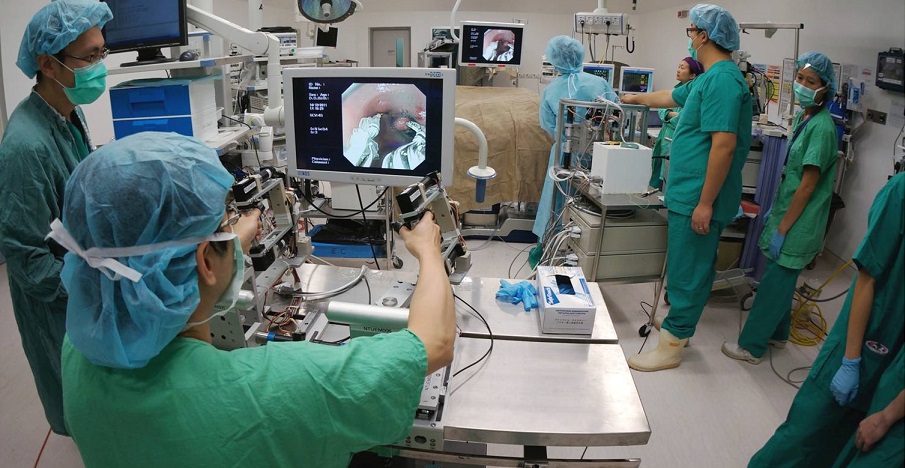
EndoMaster’s robot. Photo credit: EndoMaster.
EndoMaster is a unicorn. No, it’s not worth a billion bucks, but it’s a unique and promising medical devices startup in Singapore.
It has oodles of ambition. While many startups focus on disease detection, EndoMaster wants to get into the surgical room and the bodies of patients.
EndoMaster claims to be the closest in the world to commercialize a robot that can remove cancerous tumors from your stomach and intestines – without cutting you open.
The company has raised US$14.6 million in a series B round, enough to see it through to end-2018, when it’s aiming to release its product.
It’s in a field with little margin for error, where malfunctions could cost lives. But EndoMaster is up for the challenge.
I got a sneak peek at its latest prototype, housed in its research lab with a “no photography” sign.
There’s a chest-high computer rack housing the software and hardware. A black tube extends out of it, which is meant for insertion into the patient’s gut through the mouth or anus. Right at the end of that tube are a camera and two tiny arms – more dexterous than a surgeon’s and smaller than a toddler’s fingers.
Finally, there’s a control interface with two joysticks and a screen – similar to an arcade machine.
The resemblance is intentional, says Colin Tan, COO of EndoMaster. “It’s meant to be like playing a computer game.” Doctors will only need a week to learn the system, get certified, and start performing live surgeries.
Training for an equivalent manual surgery would take three to six months. It’s a huge boon for hospitals who won’t need to send their doctors away for so long.
Reducing the need for surgery
Aren’t there a lot of surgical robots out in the market, I ask Tan and the CEO, Goh Seow Ping, in EndoMaster’s office.
Yes, says Goh. But these robots are meant for keyhole surgery, which still requires poking holes in the body.
EndoMaster is built on top of an endoscope, which is an instrument that doctors push down the patient’s throat to look at the gut.
Endoscopic robots hold promise because open surgery can have grave complications. “There’s a cut in your abdomen. They’ll cut a portion of your colon and remove it. It’s very painful. You’ll worry about leakage, infection, cross-contamination. You’ll worry about the wound coming apart,” says Goh, wincing.
“For somebody that has cancer, it’s a huge decision to do surgery: The cuts, the pain, the bleeding, and the cost. Our procedure is incision-less. It’s as harmless as endoscopy and as effective as surgery.”
Open surgery often requires a hospital stay of between six to 14 days. EndoMaster’s procedure can eliminate that entirely. Patients leave intact and with a peace of mind. No need to pay a hefty bill for a long hospital stay.

EndoMaster’s human trial. Photo credit: EndoMaster.
From the hospital’s perspective, it frees up beds for other patients. That’s a life saver in countries where wards are overcrowded.
The catch is that EndoMaster’s system only works with early-stage gastrointestinal cancers. Even so, the market is large enough.
If all goes well, the startup projects hitting US$74 million in revenue five years after product launch. That’s just counting Europe and China, its two target markets.
It arrived at the figure by engaging a third-party market research firm, who sized up the number of relevant cancer cases in its target markets, estimated how likely EndoMaster is to convert each surgery to its procedure, and then multiplied that by the average selling price.
A marathon
EndoMaster stands out as one of the top-ten most well-funded startups in Singapore this year.
However, the reality has been that it’s hard for medtech startups in the country to raise money compared to internet companies, says Goh. Tech in Asia’s data shows only 16 medical devices startups in Singapore, compared to hundreds in popular categories like fintech and ecommerce.
No Singapore investors backed EndoMaster’s latest round, though many expressed interest in joining subsequent rounds.
It’s been a long journey. EndoMaster started off as a research project at Nanyang Technological University in 2004, formalized as a company in 2011, and looks to launch in 2018. It has performed successful trials on humans and animals. It’s planning a large-scale clinical trial and seeking approval from regulators in Europe.
Internet startups, on the other hand, go from prototype to launch in months.
“Medical devices are a long-term play. It’s not like an app, with a short payoff. So you must have a bigger pot of money to play. If $20 million is 100 percent of the fund size, that doesn’t work, which I understand.”
Investors in the series B round include unspecified Chinese VCs and Hoya Group, a supplier and manufacturer of healthcare products, which made US$4.5 billion in revenue in 2015.
With funding secured and the prototype improving with each iteration, the team of about 20 people is bracing for a marathon.
“We want to put the first big product in medical robotics from Singapore on the world map,” says Goh.
Converted from Singapore dollars. US$1 = S$1.36.
This post The rare startup that wants to put Singapore on the medical robotics map appeared first on Tech in Asia.
from Tech in Asia https://www.techinasia.com/rare-startup-put-singapore-medical-robotics-map
via IFTTT
No comments:
Post a Comment